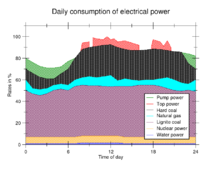Peak demand

Peak demand on an electrical grid is simply the highest electrical power demand that has occurred over a specified time period (Gönen 2008). Peak demand is typically characterized as annual, daily or seasonal and has the unit of power.[1] Peak demand, peak load or on-peak are terms used in energy demand management describing a period in which electrical power is expected to be provided for a sustained period at a significantly higher than average supply level. Peak demand fluctuations may occur on daily, monthly, seasonal and yearly cycles. For an electric utility company, the actual point of peak demand is a single half-hour or hourly period which represents the highest point of customer consumption of electricity. At this time there is a combination of office, domestic demand and at some times of the year, the fall of darkness.[2]
Some utilities will charge customers based on their individual peak demand. The highest demand during each month or even a single 15 to 30 minute period of highest use in the previous year may be used to calculate charges.[3] The renewable energy transition will include considerations for peak demand.[4]
Economic growth of the state is inversely associated with peak load.[5]
Demand Tariff
Electricity network is built to deal with the highest possible peak demand otherwise blackout may happen. In Australia, demand tariff has three components: peak demand charge, energy charge and daily connection charge. For example, for large customers (commercial, industrial or mixed of commercial/residential), the peak demand charge is based on the highest 30 minutes electricity consumption in a month; the energy charge is based on a month electricity consumption. This type of demand tariff is gradually introduced to residential households and will be rolled out by 2020 in Queensland Australia. How to manage electricity bills under demand tariff can be challenging. The key solutions involve improving building efficiency and managing the operational settings of large power appliances.[6]
When is the peak electricity demand?
It depends on the demography, the economy, the weather, the climate, the season, the day of the week and other factors. For example, in industrialised regions of China or Germany, the peak demands mostly occur in day time, while solar photovoltaic system can help reduce it. However, in more service based economy such as Australia, the daily peak demands often occur in the late afternoon to early evening time (e.g. 4pm to 8pm). Residential and commercial electricity demand contributes a lot to this type of network peak demand.[7]
Off-peak
Peak demand is considered to be the opposite to off-peak hours when power demand is usually low. There are off-peak time-of-use rates. Sometimes, there are 3 time-of-use zones: peak, shoulder and offpeak. Shoulder is often the time between peak and offpeak in weekdays. Weekends are often just peak and offpeak in terms of managing electricity loads for the network.
Response

Peak demand may exceed the maximum supply levels that the electrical power industry can generate, resulting in power outages and load shedding. This often occurs during heat waves when use of air conditioners and powered fans raises the rate of energy consumption significantly. During a shortage authorities may request the public to curtail their energy use and shift it to a non-peak period.
Power stations
Power stations specifically constructed for providing power to electrical grids for peak demand are called peaking power plants or 'peakers'. In general, Natural gas fueled power stations can be fired up rapidly and are therefore often utilized at peak demand times. Combined cycle power plants can frequently provide power for peak demand, as well as run efficiently for baseload power.[citation needed]
Hydroelectric power and pumped storage type dams such as Carters Dam in the U.S. state of Georgia help to meet peak demand as well.
The chances that a wind farm will be unable to meet peak demand are greater than for a fossil-fueled power station, due to the ability to store liquid fuels for use during peak demand.[8]
Solar power's peak output often naturally coincides with daytime peaks of usage due to air conditioning.
See also
References
- ^ Torriti, Jacopo. "Peak energy demand and Demand Side Response".
- ^ Landsberg, Dennis R.; Ronald Stewart (1980). Improving Energy Efficiency in Buildings: A Management Guide. SUNY Press. p. 456. ISBN 1438409990. Retrieved 25 June 2013.
- ^ Wang, Lijun (2008). Energy Efficiency and Management in Food Processing Facilities. CRC Press. p. 122. ISBN 978-1420063394. Retrieved 25 June 2013.
- ^ Drude, Lukas; Pereira Junior, Luiz Carlos; Rüther, Ricardo (August 2014). "Photovoltaics (PV) and electric vehicle-to-grid (V2G) strategies for peak demand reduction in urban regions in Brazil in a smart grid environment". Renewable Energy. 68: 443–451. doi:10.1016/j.renene.2014.01.049. ISSN 0960-1481.
- ^ Alipour, Sayanti; Mukherjee, Panteha; Nateghi, Roshanak (2019). "Assessing climate sensitivity of peak electricity load for resilient power systems planning and operation: A study applied to the Texas region". Energy. 185: 1143–1153. doi:10.1016/j.energy.2019.07.074.
- ^ L. Liu, W. Miller, and G. Ledwich. (2017) Solutions for reducing electricity costs for communal facilities. Australian Ageing Agenda. 39-40. Available: https://www.australianageingagenda.com.au/2017/10/27/solutions-reducing-facility-electricity-costs/ Archived 2019-05-20 at the Wayback Machine
- ^ L. Liu, M. Shafiei, G. Ledwich, W. Miller, and G. Nourbakhsh, "Correlation Study of Residential Community Demand with High PV Penetration," Australasian Universities Power Engineering Conference, p. 6
- ^ Great Britain. Parliament. House of Lords. Select Committee on Economic Affairs (2008). The Economics of Renewable Energy: 4th Report of Session 2007-08, Vol. 1: Report, Volume 1. The Stationery Office. p. 36. ISBN 978-0104013779. Retrieved 25 June 2013.

